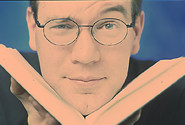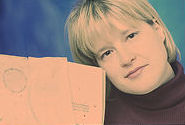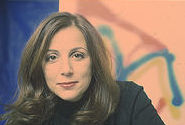Carla Cesaroni considers herself lucky. As a second-year PhD student in criminology, she thrives on her doctoral research and teaching-assistant duties, drives a 2000 Honda Civic and lives in a home in Toronto’s Riverdale area with her music-producer husband. With an annual $16,620 fellowship for three years from the Social Sciences and Humanities Research Council of Canada (SSHRC), topped up this year by a $2,000 U of T fellowship, she could hardly be better funded, she says.
Not exactly the high life, but it helps to keep the wolf from the door. For many less fortunate PhD students, the wolf is called uncertain funding, and not knowing when it might return is almost as bad as having it howling constantly on the doorstep.
Recent news should ease that strain. The university has announced that it will earmark an additional $9.4 million in base funding for graduate student support by 2004. Furthermore, as part of the university’s increased $1-billion campaign target announced last fall, the university has set a goal to raise $100 million to endow graduate student assistance. The lion’s share of that target — $70 million — is tied to an expansion of the Ontario Graduate Scholarships (OGS) program.
With the expansion, the province of Ontario will award a total of 2,000 OGSs in 2001-02, up from 1,300, and the value of each award will jump from $11,859 to $15,000. As well, universities must contribute one-third — or $5,000 — of each OGS. Based on the proportion of these scholarships that U of T students historically win, the university can expect to contribute to some 700 OGSs annually under the enhanced program.
Do the math, and it takes a cool $70 million to endow these scholarships. To that end, U of T has unrolled a matching scheme that maximizes OGSs in the social sciences and humanities. “Traditionally, we have been short of graduate student funding in these areas,” says Vice-President and Provost Adel Sedra. “We are trying to level the playing field.”
Under the new matching plan, a donation of $50,000 to programs in the social sciences and humanities will be matched by the university dollar for dollar to create an endowment of $100,000.
The resulting annual payout of $5,000, when topped by $10,000 from the Ontario government, mushrooms into a $15,000 scholarship. “Donors get a much bigger bang for their dollar,” says Ian Orchard, vice-provost, students. Donors to science, medicine and engineering also see their gifts multiply. A $100,000 donation that generates a $5,000 annual payout endows a $15,000 scholarship when combined with the government’s $10,000 contribution.
Topping the wish list of the report of the university’s Task Force on Graduate Student Financial Support in May 2000 were guaranteed minimum funding packages. The report recommended $12,000 per year (ideally $15,000, but $12,000 was deemed more achievable) plus tuition for all doctoral-stream students in their first five years of study. “This will enable students to complete their degrees faster, in addition to providing some peace of mind,” says Sedra.
With minimum funding packages now a mandate, U of T will be in a better position to compete with American universities in recruiting and funding students, says Orchard. Moreover, such financial support gives graduate students “the quality of life and respect they deserve.”
The world of crime has always fascinated Carla Cesaroni. At the age of nine, she was reading the biographies of Charles Manson and Lizzie Borden. Eventually, she became interested in forensic science. Now, at 39, Cesaroni is finally channelling her passion for the dark side into a PhD in criminology.
It took her a long time to find her niche, she says. After completing a bachelors degree in international relations and Italian at U of T in 1986, Cesaroni spent 11 years working for travel wholesalers that were marketing Canada abroad. Despite supervisory positions and the overseas trips that came with her work, she was miserable. So it was back to school, first to obtain a certificate in criminology in 1998, then a master’s degree in 1999, and now, she is working on a PhD, examining how youth cope in custody.
When Cesaroni talks about the young subjects she has worked with, her eyes light up. “I really miss them,” she says. For her master’s research, she interviewed 113 teenage boys in 11 Ontario institutions. On her first visit to one of the facilities, she saw a group of kids being led to court in handcuffs. “It’s tough — they’re children,” she says. “It’s hard to reconcile that in your mind.”
For her PhD, Cesaroni is investigating how first-time young offenders, a number of whom receive relatively short sentences, deal with such traumas as strip searches and cell confinement. She hopes to identify ways to help them cope with the stress of incarceration. Just what does she do to get troubled kids to open up? “I try to show an interest in them as human beings,” she says. She also totes along a basket brimming with chocolate.
 When PhD student James Watterson goes to a party, people sometimes cringe when he mentions his DNA research. E. coli, salmonella, viruses and airborne fungi are just some of the culprits he deals with in his work.
When PhD student James Watterson goes to a party, people sometimes cringe when he mentions his DNA research. E. coli, salmonella, viruses and airborne fungi are just some of the culprits he deals with in his work.
As part of the chemistry department’s biosensor group at the University of Toronto at Mississauga, Watterson, 27, builds synthetic DNA along millimetre-thin fibre-optic cable in order to identify the DNA of organic substances. “DNA is made up of two strands that fit together like a lock and key,” he says. In experiments, he and his colleagues replicate one strand and then introduce a test solution, such as water or blood, and wait to see if selective binding occurs. When there is a fit, they know that the DNA they are looking for — and hence the species — is there. “We’re still very much in the testing and development stage,” he says. Eventually, however, the group hopes that its work will result in an easier and faster way to detect pathogens, viruses and other nasty bugs.
Recently, Watterson, who received his master of science degree from UTM in 1999, found himself the right fit for a $15,000 Ontario Graduate Scholarship in Science and Technology. Last fall, he became the first recipient of the annual Government of Ontario/Pharmacia and Upjohn Graduate Scholarship in Science and Technology, created through a $50,000 donation from Pharmacia and Upjohn, Inc., a Mississauga-based pharmaceutical firm. U of T matched the donation, resulting in a $100,000 endowment that will generate $5,000 annually. The remaining $10,000 of the scholarship came from the Ontario government.
“I was ecstatic when I found out I’d won,” he says. The financial buffer has lessened his dependence on the income he earns as a teaching assistant at UTM. Still, he loves teaching and puts in about a dozen hours a week. With so much going for him, Watterson just laughs when asked if he dreams about making a big discovery. “Discoveries are few and far between,” he says matter-of-factly. “The biggest ones you stumble upon — they’re serendipitous.” Now that he is able to spend more time in his lab, he may have just upped his chances.
 Klaas Kraay seems undaunted by the fact that he had to recommend that a freshman be kicked out of residence the first week of school for smoking marijuana in the dorm. “It seemed harsh and a bit unfair at the time,” says Kraay, 25, a first-time don at New College. “But it’s against the law.”
Klaas Kraay seems undaunted by the fact that he had to recommend that a freshman be kicked out of residence the first week of school for smoking marijuana in the dorm. “It seemed harsh and a bit unfair at the time,” says Kraay, 25, a first-time don at New College. “But it’s against the law.”
Not everything is so black and white for Kraay. As a fourth-year PhD student in philosophy, he’s busy writing his thesis on the tension between evil and religious belief. “Some people would say that evil provides evidence against the existence of a perfectly good god,” says Kraay, a recipient of a three-year, $16,620-per-annum grant from the Social Sciences and Humanities Research Council of Canada. He believes that the two are not inconsistent and hopes to provide new insights in his thesis. “I don’t know if you can be a thinking, religious person without grasping this problem in some shape or form,” he says.
Grappling with religion is exactly what Kraay (BA 1997 Trinity) is doing. “I have a lot of doubts and a lot of questions,” he says. A Presbyterian, he recalls that dinnertime conversation was always peppered with religious issues when he was growing up in Saskatoon. Later, when he arrived at U of T as an undergraduate in 1993, he intended to study international relations, but a second-year philosophy of religion course provided stronger inspiration. Eventually he hopes to become a philosophy professor.
Kraay’s unswerving commitment to his vocation strengthens his resolve about the value of a liberal arts education. “You’re training your mind,” he says, defending the value of philosophical inquiry. “You’re training your skills as a critical being who can think about this ever-changing world.”
 For Heidi Bohaker, reconstructing history is a bit like reading a really good novel. “It has that transporting quality,” she says, “only these are real people.” The real people in history whom Bohaker, 32, finds so intriguing at the moment are the Anishnaabeg (First Nations communities of the Great Lakes) and the British, after the takeover of New France in the 1700s. For her PhD thesis, she is exploring how the Anishnaabeg (who were former allies of New France) and the British forged a new relationship despite their radically different cultures and visions for the land.
For Heidi Bohaker, reconstructing history is a bit like reading a really good novel. “It has that transporting quality,” she says, “only these are real people.” The real people in history whom Bohaker, 32, finds so intriguing at the moment are the Anishnaabeg (First Nations communities of the Great Lakes) and the British, after the takeover of New France in the 1700s. For her PhD thesis, she is exploring how the Anishnaabeg (who were former allies of New France) and the British forged a new relationship despite their radically different cultures and visions for the land.
It is painstaking work — poring over manuscripts, examining microfilm and musty documents — but Bohaker, who is receiving $16,620 a year for three years from the Social Sciences and Humanities Research Council of Canada, also relies on the Internet while researching the colonial period. “That always amazes people because they don’t think of the 18th century and technology as going together,” she says.
Bohaker worked as a database programmer before heading to the Faculty of Education at U of T, where she obtained her degree in 1993. As a high school history teacher, she canvassed companies for donations to give her school Internet access. “I really wanted students to be able to interact with primary sources,” she says. “If students get their interpretation only through textbooks, they miss what is so riveting and exciting about studying history.”
In 1997, Bohaker earned her master’s degree. After her PhD, she hopes to establish stronger links between historical research at the university level and the history taught in schools. “There is so much exciting new work in Canadian and colonial history. We need to figure out ways to share that.”
Recent Posts
U of T’s Feminist Sports Club Is Here to Bend the Rules
The group invites non-athletes to try their hand at games like dodgeball and basketball in a fun – and distinctly supportive – atmosphere
From Mental Health Studies to Michelin Guide
U of T Scarborough alum Ambica Jain’s unexpected path to restaurant success
A Blueprint for Global Prosperity
Researchers across U of T are banding together to help the United Nations meet its 17 sustainable development goals





